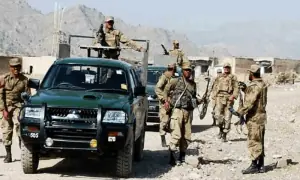Pakistan Rupee falls to historic low against US dollar
2 min readHigh oil prices kept Pakistan's currency on the back foot, which dropped to its lowest level against the US dollar, depreciating 0.27% in the inter-bank market on Monday.
As per the State Bank of Pakistan (SBP), the rupee closed at 178.61 after a day-on-day depreciation of 48 paisas or 0.27%. This is the lowest closing level of the rupee in the inter-bank. Last year on December 29, the PKR closed at 178.24 against the USD.
Rupee falls near historic low against US dollar as oil prices jump
After hitting $130 per barrel on Monday, Brent on Tuesday surged past $126 a barrel, as fears of formal sanctions against Russian oil and fuel exports spurred concerns about supply availability.
Benchmark Brent crude futures for May climbed $3.07, or 2.49%, to $126.28 a barrel. US West Texas Intermediate (WTI) crude futures for April delivery rose $2.29, or 1.92%, to 121.69 a barrel.
Prime Minister Imran Khan last week announced the slashing of petroleum products’ price by Rs10 per litre and electricity tariff by Rs5 per unit as part of a series of measures to bring some relief to the public.
However, analysts have expressed concern that with rising commodity prices in the international market, the move may backfire and add further stress on the country's already fragile economy.
“When the government took this decision, they did this in a good faith,” said Samiullah Tariq, Head of Research at Pak Kuwait Investment Company, while talking to a private channel.
“From there the price increased rapidly and oil prices have jumped up for $98 per barrel to $130 barrel. So I think that at this time, giving this subsidy is very difficult,” said Tariq.
The analyst added that apart from decreasing oil prices, reducing electricity rates is also not feasible.
“Of the six baseload power plants that we have, three are based on LNG, while three run on coal, which has a high import demand. If the price increase is not passed on, then the companies will face liquidity issues.”
“Secondly, there is a lot of pressure on oil-importing nations and this is being reflected in their euro bonds yield.
These countries should take steps to protect themselves and their reserves. So, in the same way, we should also increase prices slowly and gradually,” he added.
The story was originally published in Business Recorder on March 8, 2022.
For the latest news, follow us on Twitter @Aaj_Urdu. We are also on Facebook, Instagram and YouTube.





















Comments are closed on this story.